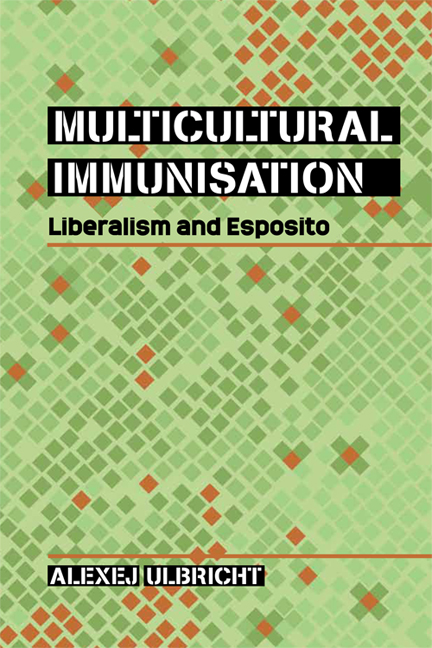Book contents
- Frontmatter
- Contents
- Acknowledgements
- 1 Introduction
- 2 Liberal Thought on Multiculturalism
- 3 Multiculturalism as a Mode of Immunising the Body of Liberalism
- 4 Liberal Multiculturalism and Rights: Citizens, Humans and Other Subjects
- 5 Disagreement and the Horizons of Consensus
- 6 Recognition: Tolerant, and Cunning
- 7 Multiculturalism Beyond Immunity
- 8 Conclusion
- Bibliography
- Index
1 - Introduction
Published online by Cambridge University Press: 05 August 2016
- Frontmatter
- Contents
- Acknowledgements
- 1 Introduction
- 2 Liberal Thought on Multiculturalism
- 3 Multiculturalism as a Mode of Immunising the Body of Liberalism
- 4 Liberal Multiculturalism and Rights: Citizens, Humans and Other Subjects
- 5 Disagreement and the Horizons of Consensus
- 6 Recognition: Tolerant, and Cunning
- 7 Multiculturalism Beyond Immunity
- 8 Conclusion
- Bibliography
- Index
Summary
This book takes as its starting point the idea that there is a contradictory situation in the UK today, where there is at one and the same time great hostility towards minorities and a persisting idea that the UK is a place that welcomes and celebrates diversity. Often this is thought about in terms of two competing discourses, one of multiculturalism, and one of a backlash against multiculturalism. I will be arguing that rather than being a mere backlash, the hostility to otherness is already inscribed within liberal multiculturalism and liberalism more generally. It is my contention that liberal multiculturalism is best understood as a process of immunisation that attempts to protect liberalism against the perceived threat of a foreign Other.
In order to argue this I will be engaging with the work of Roberto Esposito and others to demonstrate that various aspects of liberal multiculturalism can best be understood as a series of immunitary processes. I will be focusing on three types of processes in particular: rights, consensus, and recognition. However, before outlining my argument in more detail, I want to first engage in a little scene-setting and give some examples of the contradictory state of discourse on multiculturalism in Britain. This is not intended as a detailed and systemic inquiry, but rather as an illustration of the kind of discursive situation we find ourselves in. So I will start with some examples of the hysterical discourse around multiculturalism in Britain, and use this as a spring board for the theoretical argument that follows.
THE CONFLICTED RELATIONSHIP TO MULTICULTURALISM
On 5 February 2011 the British Prime Minister David Cameron gave a speech at the Munich Security conference in which he declared the failure of state multiculturalism. A few weeks later, on 14 April, Cameron gave another speech, this time to the Conservative Party Conference, about immigration, the need to curb it, and the failure of multiculturalism. Together, these speeches have been seen as the point at which the backlash against multiculturalism reached its highest level. The multiculturalism promoted by successive Labour governments was now being followed by a Tory clampdown (with Labour following suit in order to compete, as exemplified in various speeches by Ed Miliband).
- Type
- Chapter
- Information
- Multicultural ImmunisationLiberalism and Esposito, pp. 1 - 21Publisher: Edinburgh University PressPrint publication year: 2014

